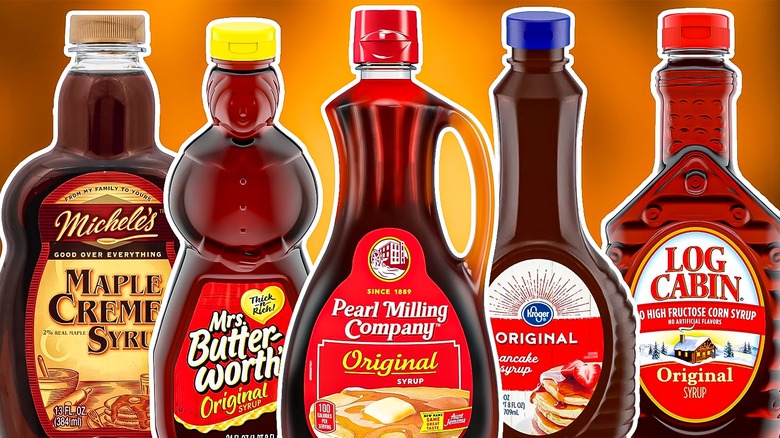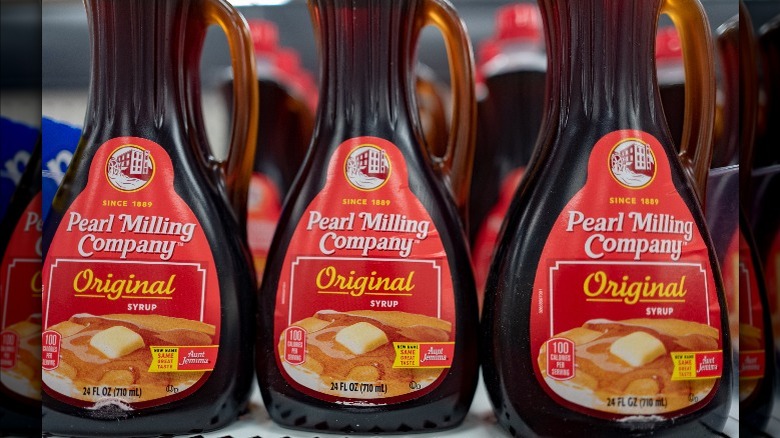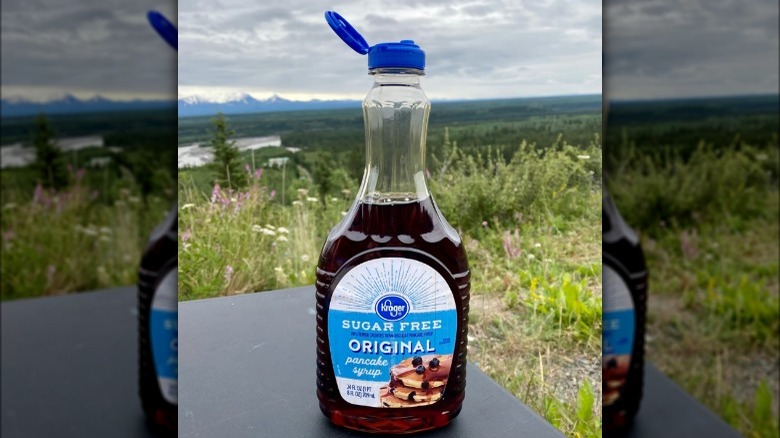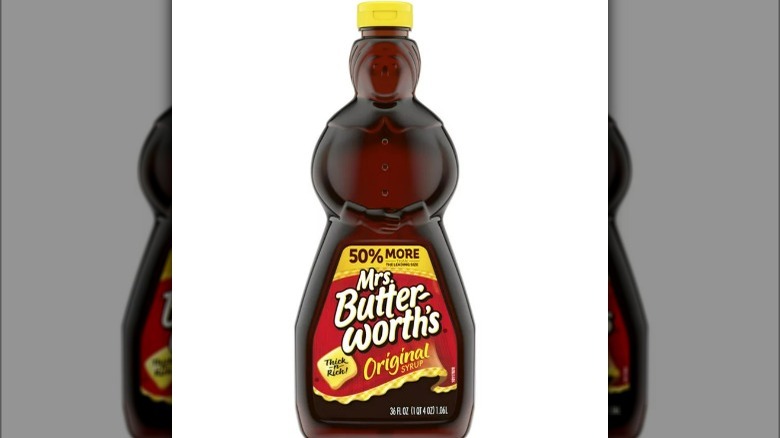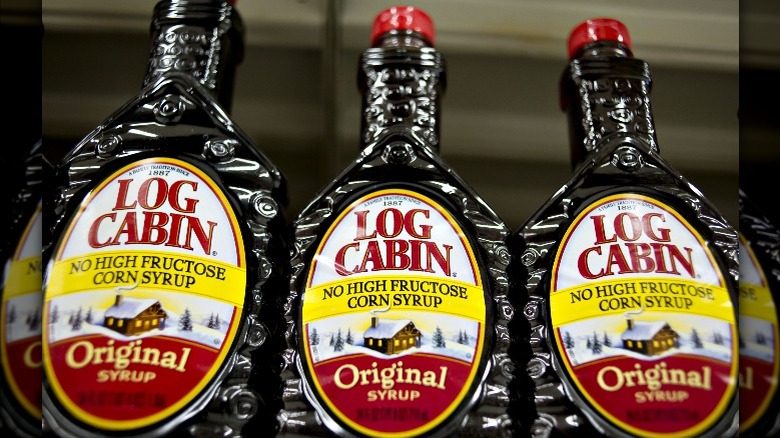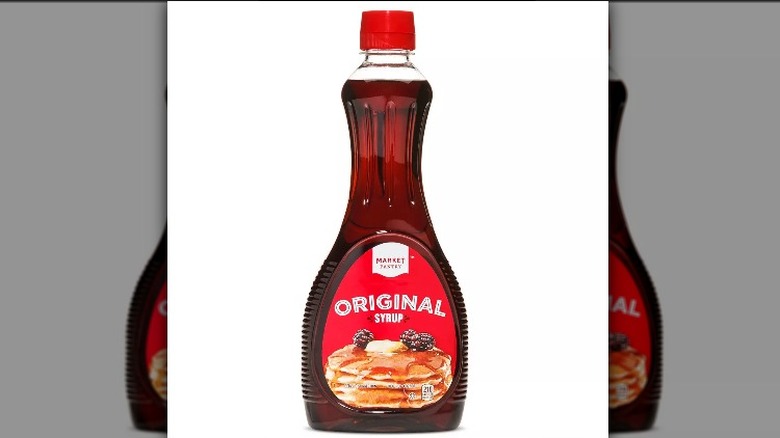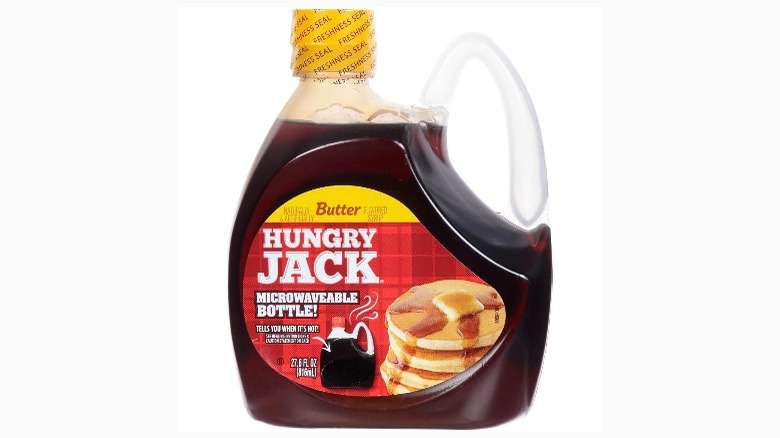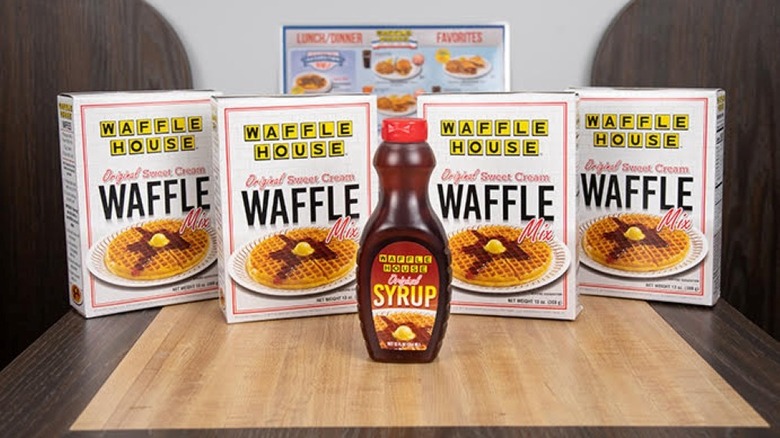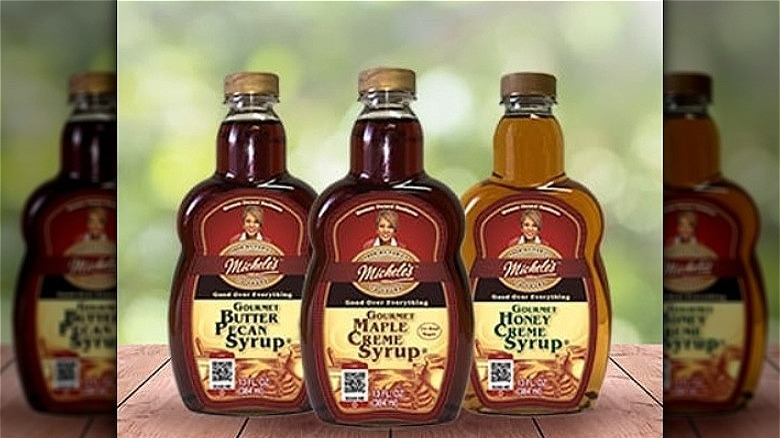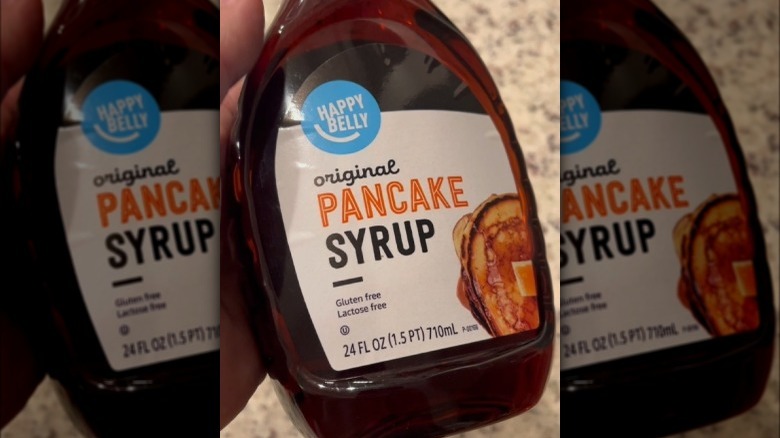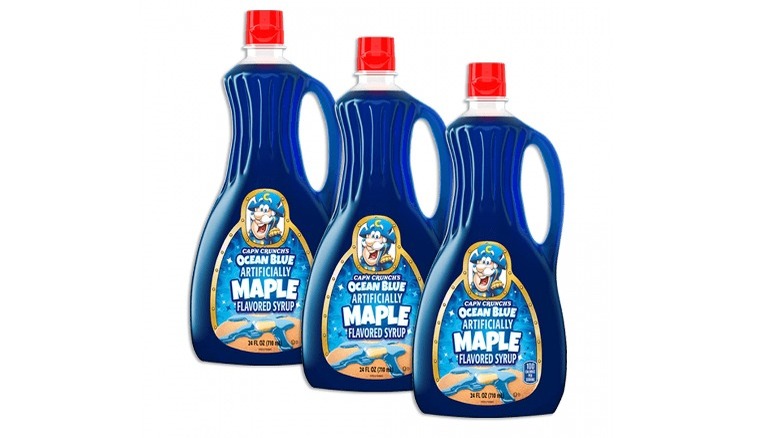10 Unhealthiest Store-Bought Syrup Brands
What would breakfast be without syrup? Drizzling this sweet, gooey liquid over pancakes, waffles, or oatmeal really elevates that morning meal. But if you're trying to be healthy, that means making better decisions from the get-go. So should you forgo all breakfast condiments? Not necessarily, but there are definitely some to avoid.
First, there's a big difference between maple syrup and other types of syrup. Maple syrup is made of one simple ingredient, which is tapped from maple trees and condensed into bottles. It's rich in antioxidants and contains minerals such as potassium, zinc, and manganese (per the International Journal of Environmental Research and Public Health).
Other syrups are often labeled "pancake" or "breakfast" and aim to reproduce that same maple flavor through various ingredients. Unfortunately, they usually achieve this by using processed chemicals and refined sugars. As such, they have little to no nutritional value — other than caloric energy, of course.
At their core, both maple and pancake syrups are basically liquid sugar. But to add health benefits to your breakfast, we recommend choosing a pure maple syrup brand over fake alternatives. Many other syrups just don't boast the same nutritional qualities. And when it comes to being unhealthy, certain companies are leading the pack. To know which to avoid, keep reading for the 10 unhealthiest store-bought syrup brands.
10. Pearl Milling Company
Even if you don't realize it, you're probably already familiar with the Pearl Milling Company's line of syrups. This brand was formally known as Aunt Jemima but thankfully retired the racist moniker in 2021 (via PR Newswire). It's been replaced with the Pearl Milling Company's name, and its website boasts "[the] same great taste as Aunt Jemima." Unfortunately, along with that same taste comes all the same unhealthy ingredients.
Currently, The Pearl Milling Company has five breakfast syrups: Original, Butter Rich, Country Rich, Original Lite, and Butter Lite. The first three syrups contain 100 calories per 2-tablespoon serving and 14-15 grams of sugar. The two lite versions have 50 calories and 12 grams of sugar per serving. All of these calories come from carbohydrates, which is pretty standard for any syrup brand. But where this brand doesn't shine is in its ingredient lists — and every single syrup is made with high-fructose corn syrup and caramel color.
Caramel color is a popular food coloring used in many breakfast syrups, giving it that rich molasses color we love. However, the manufacturing process of caramel color can produce methylimidazole (MeI-4), a known carcinogen (via Nutrition Facts). The amount of MeI-4 comes in varying degrees, but unfortunately, a study by Consumer Reports showed that Pearl Milling Company's syrups had more MeI-4 than most of the brands tested. Although the FDA says that the amount used in food products is relatively safe, we still wouldn't risk it.
9. Kroger
Kroger sells its own store-brand pancake syrups. They're easy on your wallet, but less so on your body. Because when it comes to added sugar, Kroger's syrups have plenty. Per 2-tablespoon serving, the Original Pancake Syrup contains 110 calories and 21 grams of sugar. This much sugar makes up 42% of the recommended Daily Value. If you pour a couple of servings over those flapjacks, you've nearly maxed out. And according to Healthline, excessive amounts of sugar can lead to blood sugar issues and an increased risk of cardiovascular disease.
We realize that most breakfast syrups, including pure maple syrup, are essentially all sugar. However, Kroger uses high-fructose corn syrup and corn syrup, two ingredients health-conscious consumers try to avoid.
If you are also avoiding the sweet stuff, Kroger does sell a Sugar-Free Original Pancake Syrup. It has a mere 15 calories per 2-tablespoon serving and, as its name promises, zero grams of sugar. Although it might be low in calories, this syrup comes with a huge caveat: artificial sweeteners. Kroger's sugar-free syrup uses sorbitol, which is known to cause gastrointestinal symptoms like diarrhea, bloating, and discomfort (per Canadian Family Physicians). And an unhappy belly can lead to poor digestion overall.
8. Mrs. Butterworth's
The Mrs. Butterworth's brand describes its syrup as "So thick. So rich. And still...just as sweet." But what the company doesn't advertise is that sweetness comes from high-fructose corn syrup (HFCS).
Mrs. Butterworth's Original Syrup has 110 calories and 22 grams of sugar per 2-tablespoon serving. This amount of added sugar is significant, and the fact that it comes from HFCS only makes it worse. In a study published in BMC Nutrition, people who consumed HFCS had higher risks of heart disease than those consuming fructose from a natural source, like fruit juice. In another study published in the npj Science of Food, HFCS changed the microbiome of otherwise healthy mice, decreasing bacterial diversity. This shows that not all sugar is created equal. So while most syrups are heavy on the sugar content, ones with HFCS are significantly unhealthier.
You might be surprised to learn that Mrs. Butterworth's makes a variety of syrups. But one that stood out was its Fruity Pebbles Flavored Pancake Syrup. A bright red hue and the name "Fruity Pebbles" doesn't exactly scream nutrition. We can't say we were surprised to find Red 40 on the ingredient label. Red Dye 40 is made from petroleum and is linked to ADHD, irritability, depression, and allergic reactions, just to name a few (per Cleveland Clinic).
7. Log Cabin
Log Cabin uses clever marketing tactics, making you believe their products are healthier than they really are. On the front packaging for Log Cabin Original Syrup, the company highlights that it has no high-fructose corn syrup or artificial flavors. But if you flip the bottle around, you'll notice this product doesn't quite fit the bill of a "clean label."
A 2-tablespoon serving has 110 calories and 11 grams of sugar. The ingredient might not have HFCS. Still, it does have regular corn syrup and sugar, which are both devoid of significant amounts of vitamins and minerals (per USDA). And while there are no artificial flavors, there are definitely preservatives and artificial coloring.
If you're going to consume the Log Cabin brand, opt for its All Natural Table Syrup. This option has "no high-fructose corn syrup, no preservatives, and no artificial colors or flavors." However, instead of real Maple syrup, it contains brown rice syrup, cane sugar, and brown sugar. These items aren't as processed as HFCS, but they aren't known for their health benefits either. At the end of the day, Log Cabin is just a bottle of empty calories.
6. Market Pantry
Everyone loves a trip to Target; you can find almost anything there. But if you're looking for healthy store-bought syrups, avoid the Market Pantry brand (and read those labels carefully). The Market Pantry Original Syrup has 210 calories and 33 grams of sugar per serving. However, this is where paying attention to serving size matters. One serving rings in at 60 milliliters, or 4 tablespoons – twice as much as the other syrups on our list. (But if we're being honest, that's how much we'd pour over our pancakes anyways.)
In fact, it's fairly comparable to most of the "unhealthy" syrup brands out there. It has all the usual suspects, like high-fructose corn syrup and caramel color. But if you look closely, you'll notice Market Pantry syrups are also made with cellulose gum. This thickening agent also goes by carboxymethylcellulose. At one point, it was deemed safe for consumption; otherwise, it wouldn't be allowed on store shelves. However, more recent research points in a different direction.
A 2021 study showed that eating foods with cellulose gum can worsen your gut health. After consuming it, subjects experienced stomach pain, indicating something was up. Upon further investigation, researchers noticed that the cellulose gum had caused lowered diversity in gut microbiota. Why is this a bad thing? As Hippocrates said, "All disease begins in the gut." The less diverse our microbiome is, the less resilient we are, leading to a poor immune system and overall health (via Nature).
5. Hungry Jack
Hungry Jack brings the ultimate convenience to a breakfast condiment. Its bottles are microwave-safe for up to two minutes, and when ready, the word "HOT" magically appears on the side. Also, the lid functions as an easy-pour cap. So with just a flip of the finger, you can drizzle hot liquid gold over those warm waffles. These features definitely pique our interest. But are they enough to overlook the unhealthy attributes of the brand?
Hungry Jack offers six different flavors of syrup. The majority have 110 calories and 19-20 grams of sugar per 2-tablespoon serving. The primary ingredients of the Original Syrup are corn syrup, high-fructose corn syrup, and water. Truthfully, water may be its only nutritional component.
But where we really questioned this brand was with its Sugar-Free Butter Syrup. This flavor had 10 calories and 0 grams of sugar per serving. However, it had 4 grams of sugar alcohol and three different non-nutritive sweeteners.
The term "non-nutritive" speaks for itself. It's one thing not to bring nutritional value to the table, and another thing entirely to bring actual harm. In May 2023, the World Health Organization released new guidelines which recommend "against the use of NSS (non-sugar sweeteners) to control body weight or reduce the risk of noncommunicable diseases" and discovered that these sweeteners could actually "increase the risk of type-2 diabetes, cardiovascular disease, and mortality in adults."
4. Waffle House
If you're craving that Waffle House syrup, the company sells it by the bottle. Combined with its waffle mix, you can have a full restaurant-style breakfast from the comfort of your home. But if you're trying to be healthier, you might want to reconsider.
The Waffle House Original Syrup gets the prize for the most calories on this list. Two tablespoons contain 120 calories and 18 grams of sugar. It uses three types of refined sugars and three different preservatives. And instead of real maple syrup, you'll get artificial maple flavor and caramel color.
Often, brands use artificial ingredients because they're less expensive. But what exactly is "artificial maple syrup"? According to Michael Hansen, senior scientist at Consumer Reports, "the specific ingredients generally aren't reviewed by the FDA — and companies are usually not required to disclose the ingredients of natural or artificial flavors on food labels — it's difficult to know for sure. For this reason, people with food allergies should be particularly careful when consuming food or drinks that have either natural or artificial flavorings."
3. Michele Foods
Michele's Gourmet Syrups come in three flavors. The most traditional of the bunch is the Maple Cream, described as "a unique blend of maple, honey, and cream flavors." The product does have some pros, being the only brand on this list that uses pure maple syrup and honey. Sadly, real maple syrup only makes up 2% of this sweet condiment. Instead, the first ingredient on the label is corn syrup.
Corn syrup is a liquid sugar made from cornstarch. While maple syrup claims some health benefits, you won't hear dietitians raving about corn syrup anytime soon. So why use corn syrup at all? Honey and maple syrup are more expensive — and adding refined sugars would likely reduce production costs. We understand the need to cut corners. But if the intention was to create a healthy breakfast condiment, the end result fell short.
Per 2-tablespoon serving, the Maple Cream Syrup has 110 calories and 14 grams of sugar. This is less sugar than most of the original pancake syrups we've come across. However, Michele's other syrups are dripping with high sugar content. If you pour two tablespoons of the Butter Pecan or the Honey Creme flavors, you'll get the same 110 calories but with a whopping 27 grams of sugar.
2. Happy Belly
When you hear the brand name "Happy Belly," you assume its products will be full of healthy ingredients to benefit your gut health, like probiotics. Unfortunately, this couldn't be further from the truth.
A two-tablespoon serving has 100 calories and 16 grams of sugar. And when looking at the label, very few ingredients have any nutritional value at all. In fact, the first two listed items are corn syrup and HFCS. Both these sweeteners start from cornstarch, but high-fructose corn syrup is the ultra-processed version of corn syrup. Corn syrup is all glucose, but when HFCS is made, a high percentage of glucose is converted to fructose (via Indiana Sugars). And this simple sugar has a bad rap for a reason.
Unlike glucose, fructose can't be used by just any cells, and must be broken down by the liver (via MedicineNet). When consumed, fructose puts extra stress on this crucial organ, and large amounts can contribute to liver-related illnesses like non-alcoholic fatty liver disease (per Diabetes, Metabolic Syndrome, and Obesity). As the name suggests, non-alcoholic fatty liver disease is when you have too much fat in your liver cells, causing inflammation, scarring, and, in worst-case scenarios, liver failure (per Mayo Clinic). To spare your liver, we'd lay off Happy Belly's fructose-full syrup.
1. Cap'n Crunch
Cap'n Crunch is bringing more than just adventure to the breakfast table these days. Now, the famous cereal connoisseur also makes syrup. But this isn't your average maple syrup. Cap'n Crunch's Ocean Blue Artificially Flavored Maple Syrup definitely makes a creative pancake topping. And as the Cap'n Crunch brand describes, it "has the sweet and delicious taste of classic syrup with a playful burst of blue." While it'll brighten up your breakfast, it isn't the healthiest choice.
A bright blue color is bound to raise health concerns, especially since Cap'n Crunch uses Blue 1 to achieve this effect. In a review published in Advances in Nutrition, Blue 1 showed a potential for neurotoxicity. This is a fancy way of saying that consuming too much can affect how your nervous system functions. Your nervous system helps different parts of your body communicate with each other. When things go awry, it can affect everything from your memory to your mood.
But Blue 1's adverse effects don't end there. The research also showed that it can cause bronchial constriction and allergic reactions. So if you're prone to breathing issues or asthma, stay clear of this colorful condiment.
To make matters worse, artificial color isn't the only reason to be wary of the old captain. Per 2-tablespoon serving, this syrup has 100 calories and 15 grams of sugar, plus a whole host of ingredients that would make any dietitian cringe, including caramel color and HFCS.
